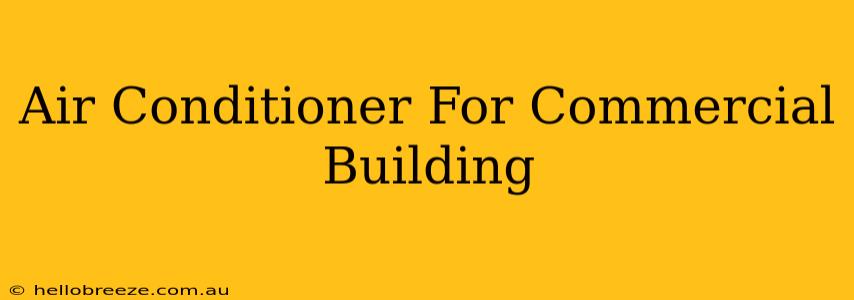Choosing the right air conditioning system for your commercial building is a critical decision impacting both comfort and operational costs. This comprehensive guide will navigate you through the essential factors to consider when selecting the best air conditioner for your specific needs.
Understanding Your Commercial AC Needs
Before diving into specific systems, assessing your building's unique requirements is paramount. Consider these factors:
-
Building Size and Layout: The square footage, number of rooms, and ceiling height directly influence the capacity (BTU rating) of the AC system needed. A larger building naturally necessitates a more powerful system. Complex layouts might require a zoned system for better temperature control.
-
Occupancy: The number of people regularly occupying the space significantly impacts the cooling load. High occupancy areas like offices or retail spaces will demand more powerful cooling than less-frequented areas.
-
Climate: The local climate dictates the intensity of cooling needed. Areas with consistently hot and humid summers will require higher-capacity systems compared to those with moderate climates.
-
Budget: Air conditioning systems span a wide price range, from relatively inexpensive units to sophisticated, high-efficiency models. Establish a realistic budget early in the process to streamline your choices.
-
Energy Efficiency: Operating costs are a major long-term consideration. Choosing an energy-efficient system—look for SEER ratings (Seasonal Energy Efficiency Ratio)—can save you substantial money over the system's lifespan.
Types of Commercial Air Conditioning Systems
Several types of AC systems cater to different commercial building needs:
1. Packaged Units:
These self-contained units are ideal for smaller commercial spaces. They house all components—compressor, condenser, and evaporator coil—in a single unit, simplifying installation and maintenance. They are typically less expensive than other systems.
2. Split Systems:
Split systems separate the condenser unit (located outdoors) from the evaporator coil (indoors). This setup offers flexibility in placement and often delivers superior performance and energy efficiency compared to packaged units. They are suitable for larger spaces and can be easily scaled to accommodate various cooling requirements.
3. Variable Refrigerant Flow (VRF) Systems:
VRF systems offer superior temperature control by adjusting refrigerant flow to individual zones within the building. This precision allows for customized climate control in different areas, enhancing energy efficiency by cooling only occupied spaces. They're perfect for large, multi-zone buildings.
4. Chillers:
Chillers are typically used in very large commercial buildings or complexes. They use water or another refrigerant to cool water, which is then circulated through a network of air handling units (AHUs) throughout the building. Chillers are highly efficient but require extensive infrastructure.
Choosing the Right Commercial AC System: Key Considerations
-
SEER Rating: A higher SEER rating denotes greater energy efficiency. Aim for a high SEER rating to minimize long-term energy costs.
-
Maintenance: Regular maintenance is crucial for optimal performance and longevity. Factor in the cost and ease of maintenance when making your decision.
-
Installation: Professional installation is critical for proper functionality and warranty validity. Choose a reputable HVAC contractor with experience in commercial installations.
-
Warranty: Check the warranty offered by the manufacturer. A comprehensive warranty protects your investment and provides peace of mind.
-
Future Scalability: Consider the possibility of future expansion or changes in your business needs. Choose a system that can be easily upgraded or scaled as your requirements evolve.
Maintaining Your Commercial Air Conditioning System
Regular maintenance is essential to maximize the lifespan and efficiency of your commercial AC system. This includes:
- Regular filter changes: Dirty filters restrict airflow and reduce efficiency.
- Coil cleaning: Clean coils improve heat transfer and prevent performance degradation.
- Professional inspections: Schedule annual inspections by a qualified technician to identify and address potential issues early.
By carefully considering these factors and consulting with experienced HVAC professionals, you can select the ideal air conditioning system for your commercial building, ensuring a comfortable and productive environment for years to come. Remember to always prioritize energy efficiency and long-term cost-effectiveness.

